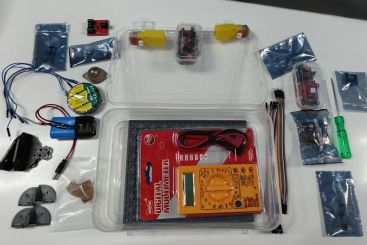1668A, 14th Main Rd, Sector 7, HSR Layout, Bengaluru, Karnataka 560102
+91 99459 30733 (9am - 6pm IST, Saturday - Sunday) (10am - 7pm IST, Tuesday - Friday)
The Robot Electronics course delves into the essential components of robotics, focusing on electronics and mechanics. This course is designed to be both educational and engaging, with a hands-on approach to learning. Students will explore the basics of electronics through fun and interactive circuits, starting with fundamental concepts such as voltage, current, resistance, and capacitance.
We emphasize practical learning by conducting experiments that reinforce theoretical knowledge and encourage creative problem-solving. Students will not only understand the theoretical aspects but also apply them in real-world scenarios, crafting innovative solutions from the concepts they’ve mastered. The course covers the fundamentals of electronic circuit design and construction, providing an introduction to various sensors and actuators commonly used in real-life robotics applications.
Laptop or Desktop Required: students are required to have access to a laptop or desktop computer equipped with a functioning microphone and camera.
Learning Mode: The course is conducted through live instructor-led sessions, ensuring personalized guidance and interaction.
No Distractions: To maximize learning, it’s essential for students to engage in the classes without distractions.
Upon Completion of the Course, Students Will Have:
Understanding of Basic Electronics: Gained a solid understanding of fundamental electronics concepts, including voltage, current, resistance, and capacitance.
Practical Experience in Circuit Design: Acquired hands-on experience in designing and constructing electronic circuits, reinforcing their theoretical knowledge.
Application of Knowledge in Real-World Scenarios: Developed the ability to apply learned concepts to real-world problems, creating innovative solutions in robotics.
Introduction to Sensors and Actuators: Learned about various sensors and actuators used in robotics, gaining insights into their applications in everyday technologies.
Problem-Solving and Critical Thinking: Enhanced their problem-solving skills by engaging in experiments and projects that challenge their understanding and creativity.
Foundation for Advanced Robotics Studies: Built a strong foundation in robotics electronics, preparing them for more advanced studies in robotics, engineering, and related fields.

1. Fundamentals of Robotics
Day 2. Switches & Potentiometer
3. Multimeter & Motor
4. Sensors and their applications
5. Morse Code & Tilt Sensor
6. Motor Driver
7. Line Follower
8. Obstacle Avoider